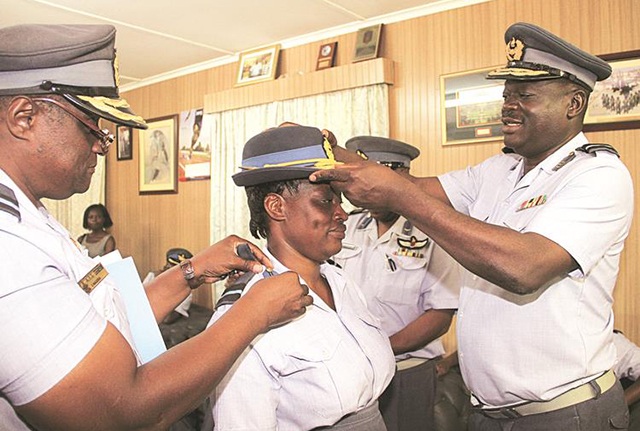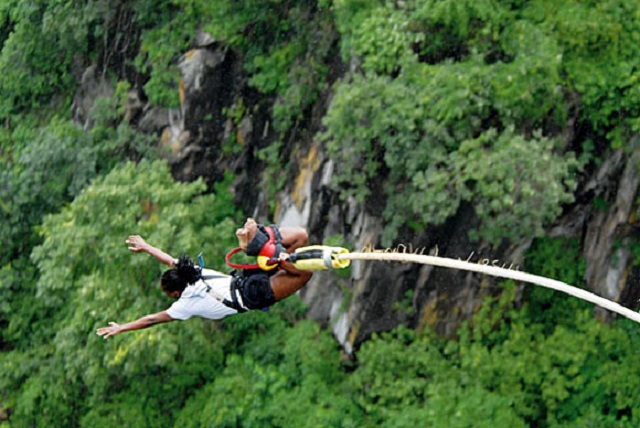GENDER: Women and decision-making: Sky is the limit


Air Force of Zimbabwe Commander Air Marshal Perrance Shiri (right) confers Air Commodore Ellen Chiweshe with her new rank at Air Force headquarters in Harare on Monday, whIle Air Commodore Selebale Masera assists
Vaidah Mashangwa
On January 4, 2016, President Robert Mugabe promoted Air Force of Zimbabwe Group Captain Ellen Chiweshe to the rank of Air Commodore.
AFZ Commander, Air Marshal Perrance Shiri, conferred Air Commodore Chiweshe with her new rank. Air Commodore Chiweshe becomes the first woman to hold such a high rank in the Air force of Zimbabwe.
His Excellency President Mugabe should be highly commended for the promotion as this shows the government’s commitment in achieving gender parity in both the private and public sector. The Zimbabwe Defence Force has a female Brigadier-General namely Shylet Moyo who was promoted in 2013.
In addition, on December 18, 2015, Zimbabwe National Army saw 22 senior army officials being promoted to the ranks of Brigadier-General and Colonels. Lindiwe Ngwenya was elevated to the Brigadier-General rank while other three female officers became colonels. Major-Gen Douglas Nyikayaramba said the Zimbabwe National Army was compliant with the government efforts on Gender equality as indicated by the promotions.
Within the Zimbabwe Republic Police there is Deputy Commissioner General Josephine Shambare.
The World Economic Forum reports that across 134 countries, greater gender equality correlates positively with per capita Gross National Product.
A recent research also acknowledged that private sector firms with the largest share of women in top management perform best and this also applies in the public sector. Women are generally hard working and that is the reason why they are able to balance the family and work related tasks at the same time.
This development comes at a time when over 186 countries worldwide have ratified the Convention on the Elimination of all forms of Discrimination Against Women (CEDAW). According to the UN, women promoting gender equality should be the core business of the international community.
It is actually SMART economics to ensure that there is gender equality and empowerment of women. The world over, women have been lagging behind in terms of access to resources and credit. Women have been subjected to violence and excluded from taking part in key economic sectors and their participation in education is limited.
Gender equality is a key driver to development of economies. However, it has emerged that in many countries investment in gender dimensions is still lacking. In order to achieve the SDGs, there is need to ensure that women who constitute 52 percent of the population are taken on board.
Currently men and women in decision making positions in Zimbabwe are as follows:
Institution Female Male Total
Parliament 86 184 270
Cabinet Ministers 38 42 80
Provincial Ministers 4 6 10
Perm Sec 9 21 30
Directors 76 194 270
Deputy Directors 121 363 484
Councillors 323 1321 1644
Principal Directors 41 129 170
Counsular 0 5 5
Ambassadors 10 31 41
State Varsity-Chancellors 3 8 11
Board Of Parastatals 29 71 100
CEOs of State Enterprises 23 77 100
This shows great disparities in terms of men and women participation in higher positions of power in both private and public sector. Actually women account for only 19 percent of Parliamentarians worldwide according to the International Parliamentary Union. This is despite the fact that women’s participation in governance has shown to lead to greater investment in human capital.
According to the Sadc Gender Protocol 2013, in Zimbabwe women representation in top decision making in the security sector remains below 30 percent. In terms of women representation in peacekeeping, there were 31 percent women in 2011 and this increased to 42 percent in 2012. Women comprise 20 percent of those in the Defence sector and 25 percent of the members in the police force.
Zimbabwe is among the only country in the Sadc region to have achieved a representation of 20 percent women and above. The other three are South Africa (27 percent), Seychelles (20 percent) and Namibia (26 percent).
South Africa has the highest number of women in the Defence forces.
In terms of the Police force, Zimbabwe is also in the top five in the region including South Africa (33 percent), Seychelles (38 percent), Namibia (35 percent) and Malawi (25 percent).The ZRP has made notable progress in terms of including female officers in its contingents participating in the UN Peacekeeping operations.
When the ZRP peacekeepers participated in the mission to Angola in 1993 there were no females among the 25 police officers sent. By 2012 some 189 female police officers out of 1,063 officers had participated in peacekeeping missions. To date according to UN Women, women police officers have participated in missions in East Timor, Sierra Leonne, Kosovo, Sudan, South Sudan, Liberia and Darfur.
In order to achieve gender equality in decision making positions, there is need for a critical mass of female participation with the necessary skills and training so that they are also as effective as required. The success of electoral quotas to ensure women’s participation in the political sphere requires the political will and engagements of political parties across the globe. While Zimbabwe reserved 60 seats for women in the 2013 general elections women representation is still low.
Nearly half of the world’s countries today have some form of electoral quota for women in parliamentary politics. Rwanda recently overtook Finland and Sweden as the country with the highest proportion of women parliamentarians.
There is need for constant research in terms of how women can further be incorporated in the various decision making positions. Actually data collection on the status of women is inadequate in many countries. Some political advocates have recommended a 50 percent quota system to ensure that a 50/50 representation of men and women is achieved.
In Tanzania for example, 37 out of 40 appointed parliamentary seats are reserved for women. This guarantees women representation in political structures and into parliament.
Apart from that, women also need a strong financial support system during elections. There is need to set up a political fund for aspiring female candidates during elections so that that they campaign in a most effective and efficient manner.
Some female candidates also need on-going training and capacity building in both rural and urban areas to help them gain their confidence and participation in their campaign from a well-informed position. There is also need to encourage educated and professional women to join politics.
Above all, communities should be educated on the need to vote for female candidates. There is a need for all countries to respect and support human rights and non-discrimination.
It is unfortunate that women’s participation in politics is still constrained by the infringement of their rights and the cultural norms and values which still persist.
There are also impediments ranging from legal barriers to social norms and family responsibilities. The sky is the limit; women can still make it in the political, economic and public spheres if these barriers are totally addressed.
Vaidah Mashangwa is Bulawayo Provincial Development Officer in the Ministry of Women Affairs, Gender and Community Development. She can be contacted on 0772111592 email [email protected]












Comments